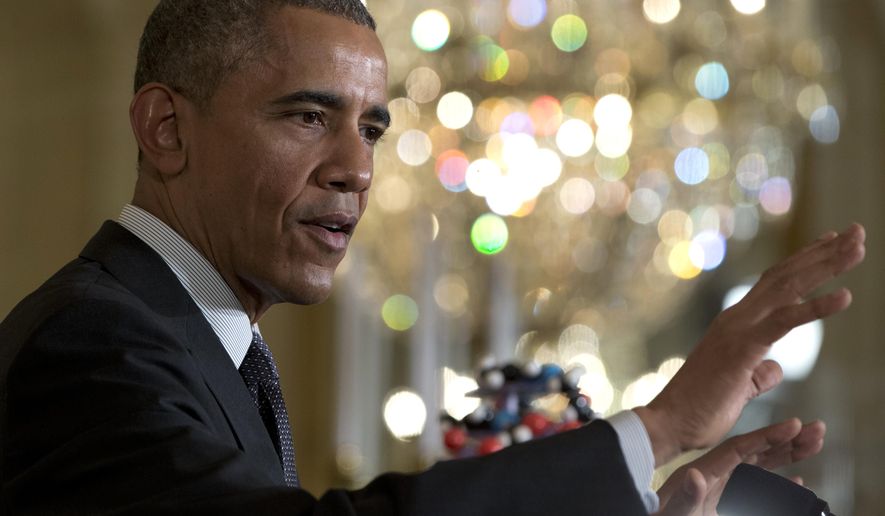Criticized for avoiding the phrase “Islamic extremism,” President Obama said he doesn’t want to alienate the majority of peace-loving Muslims as the U.S. fights to defeat terrorist networks around the world.
“I think that for us to be successful in fighting this scourge, it’s very important for us to align ourselves with the 99.9 percent of Muslims who are looking for the same thing we’re looking for — order, peace, prosperity,” Mr. Obama said on CNN. “And so I don’t quibble with labels.”
The president also said he doesn’t want to “over-inflate” the importance of terrorist groups by sending U.S. troops to occupy countries in the Middle East or by “playing whack-a-mole” against terrorist leaders because it drains America’s financial strength.
After the terrorist attacks in Paris last month that killed at least 17 people, Mr. Obama was widely criticized for referring to “violent extremism” instead of violence motivated by Islamist beliefs. Republicans and even some Democratic critics say the president and his advisers are ignoring the root causes of jihadi attacks.
The White House also insisted last week that negotiations with the Taliban in Afghanistan in a prisoner exchange did not violate U.S. policy because the administration does not classify the group as a terrorist organization.
White House press secretary Josh Earnest said the Taliban threat is mainly confined to U.S. interests in Afghanistan, while groups such as al Qaeda carry a broader threat. But he did say of the Taliban, “they do carry out tactics that are akin to terrorism. They do pursue terror attacks in an effort to try to advance their agenda.”
SEE ALSO: Obama lacks strategy to stop Islamic State expansion
The Afghan Taliban is not on the State Department’s list of Foreign Terrorist Organizations, but the Treasury Department does identify the group on its list of specially designated terrorists.
In the interview with CNN’s Fareed Zakaria, recorded last week, the president said he’s trying not to give terrorists more credit than they deserve.
“I think we all recognize that this is a particular problem that has roots in Muslim communities, and that the Middle East and South Asia are sort of ground zero for us needing to win back hearts and minds, particularly when it comes to young people,” Mr. Obama said. “But I think we do ourselves a disservice in this fight if we are not taking into account the fact that the overwhelming majority of Muslims reject this ideology. I reject a notion that somehow that creates a religious war, because the overwhelming majority of Muslims reject that interpretation of Islam.”
Mr. Obama said he is not downplaying the threat of terrorism against the U.S., but said he wants to keep the war against extremists in the “proper perspective.”
“Look, I have to talk to the families of those who are killed by terrorists,” Mr. Obama said. “I have to talk to the families of soldiers of ours who fought to make sure that al Qaeda … couldn’t carry out attacks against us again. I’m pretty mindful of the terrible costs of terrorism around the world. What I do insist on is that we maintain a proper perspective and that we do not provide a victory to these terrorist networks by overinflating their importance and suggesting in some fashion that they are an existential threat to the United States or the world order.”
The U.S. has been leading a bombing campaign against the Islamic State terrorist group in Iraq and Syria since last August.
SEE ALSO: Scott Walker has White House advantage after Mitt Romney’s retreat
Mr. Obama also said he wants to ensure that the U.S. military response to terrorists does not alter “the essence of who we are.”
“That means that we don’t torture, for example, and thereby undermine our values and credibility around the world,” Mr. Obama said. “It means that we don’t approach this with a strategy of sending out occupying armies and playing whack-a-mole wherever a terrorist group appears, because that drains our economic strength and it puts enormous burdens on our military. What’s required is a surgical, precise response to a very specific problem.”
He added, “We can’t give them the victory of overinflating what they do … and we can’t make the mistake of being reactive to them. We have to have a very precise strategy in terms of how to defeat them.”
• Dave Boyer can be reached at dboyer@washingtontimes.com.




Please read our comment policy before commenting.